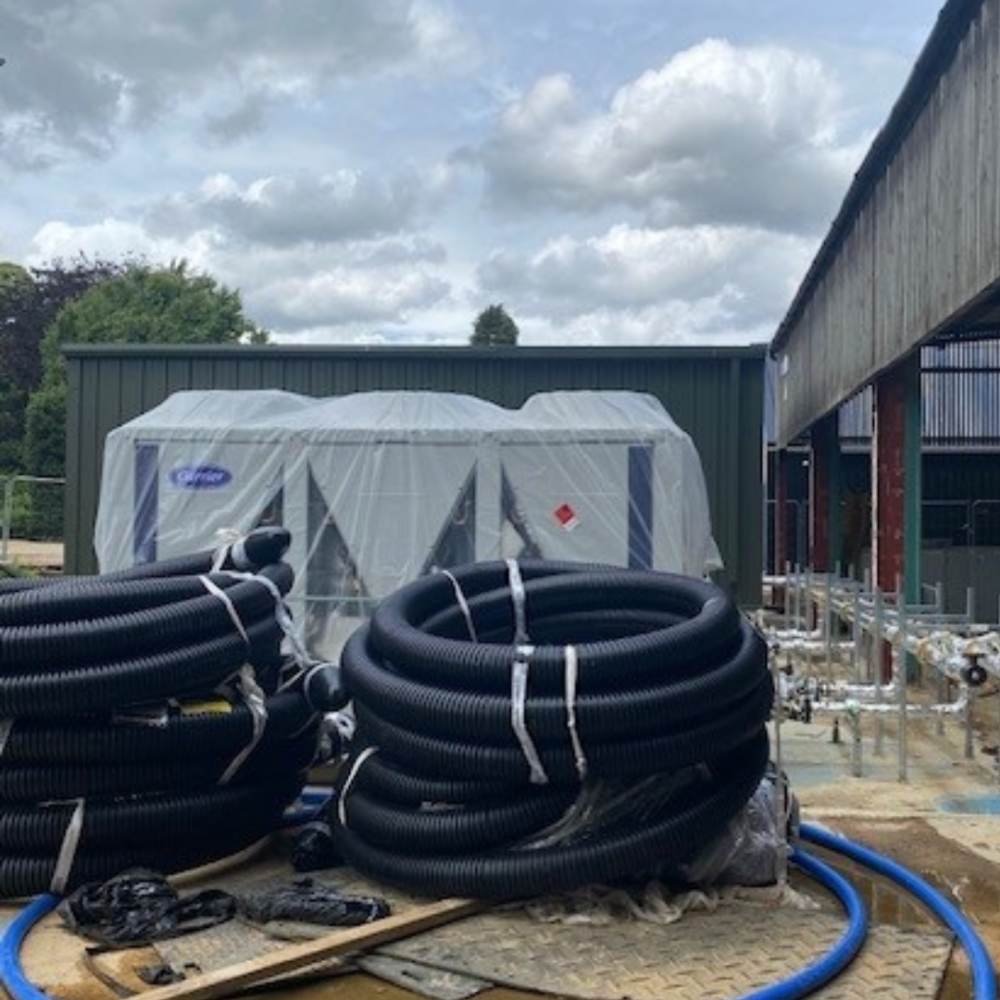Green upgrades will benefit future environmentalists in Bedfordshire
Student accommodation and learning spaces will receive sustainability upgrades at a popular further education institution in the south east midlands.
Students and staff at Bedford College Group’s Shuttleworth College are set to benefit from a comprehensive decarbonisation programme that will upgrade their halls of residence.
Based in Old Warden Park near Biggleswade, Shuttleworth College specialises in land-based agricultural and environmental education courses such as animal sciences, equine studies and outdoor adventure.
Our team visited the college to meet stakeholders and discuss how their latest Public Sector Decarbonisation Scheme project at the accommodation block, Russell Hall and the Learning Resource Centre will benefit staff and students. Discussion also focused on how works build on other sustainability projects completed across the group’s multiple-college estate.
Dave Roffey, director of projects and sustainability at Bedford College Group, said: “The Bedford College Group aims to positively respond to climate change by reducing our impact on the environment, helping to boost the economy through the delivery of green skills and inspiring our learners and staff to tackle climate action.
“Our goal is to be a net zero organisation and a leader in sustainability practices.
“We would like to thank Salix for their assistance with our journey towards this goal.”
The Bedford College Group aims to positively respond to climate change by reducing our impact on the environment, helping to boost the economy through the delivery of green skills and inspiring our learners and staff to tackle climate action.
Claudia Head, client support officer at Salix, said: “It’s fantastic to see the progress at the college and to discuss how Public Sector Decarbonisation Scheme funding have accelerated their pathway to net zero.
“When we visit these sites, we gain valuable first-hand knowledge on the challenges and opportunities facing organisations on their journey to decarbonise their estate.
“The visits also provide a great opportunity to meet the passionate, inspiring individuals who are driving and delivering these incredible projects.”
It’s fantastic to see the progress at the college and to discuss how Public Sector Decarbonisation Scheme funding have accelerated their pathway to net zero.
Bedford College Group run five colleges in and around Bedfordshire and prides itself as being the largest provider of education in the south east midlands, supporting more than 15,000 students every year.
The group has undertaken multiple projects across their sites, including a £4,531,724 project at Shuttleworth College for which they were awarded £2,515,001 through Phase 3b Public Sector Decarbonisation Scheme. Our teams at Salix deliver this funding on behalf of the Department for Energy Security and Net Zero.
Alongside the replacement of fossil fuel heating systems in favour of air source heat pumps, this project will see insulation and fabric upgrades which should ensure the buildings better retain heat which means they will be more comfortable for the people who use them.
Additional upgrades at the accommodation block include roof insulation, double glazing, dry wall lining and the introduction of a remotely-managed building management system which will allow maintenance staff to keep the building to a more consistently comfortable temperature for residents. Air handling units at Russell Hall will be upgraded, plus roof insulation will be installed and a remotely-managed building management system will be introduced both at the hall and the Learning Resources Centre.
Claudia added: “During the visit, we were able to tour the campus to see the plant room and the air source heat pumps which are now in position.
“We also visited the accommodation block where rooms had been gutted in preparation for window replacements, timed aptly during the term break to ensure minimal disruption to the students.”
Energy experts at the college expect the upgrades will reduce the group’s annual carbon emissions by more than 382 tonnes, which is the equivalent of flying from London to New York 55 times or driving from London to Glasgow 345 times*. They also expect the works to bring the college’s energy bills down by £135,466 every year.
The works at the Shuttleworth College are a part of a broader decarbonisation programme driven by a 2050 net zero ambition across the multi-college estate. To support these ambitions, the group has also received funding through Phase 1 and Phase 3a of the Public Sector Decarbonisation Scheme.
Their Phase 1 project saw £2,831,454.99 awarded for upgrades to 16 buildings across multiple colleges in their estate. This included the installation of solar panels on the Zoological Education Centre at the Shuttleworth Campus. This 24/7, unique facility is home to a purpose-built humidity room and a tropical biosphere that houses tropical rainforest species and exotic animals including birds, reptiles, amphibians and alligators.
Their Phase 3a project saw £3,136,877 in funding delivered for £5,355,900 of works that focused on the introduction of low-carbon heating and accompanying insulation measures at two buildings – The Brundtland Building and Tower Block – at their Bedford College Cauldwell Street Campus.
Claudia added: “The works we toured at the Shuttleworth College are an important part of a broader and more comprehensive decarbonisation plan that the group is implementing across their colleges.”
“It is great to see how these projects work together to propel them towards their overarching net zero targets, and how the lessons learned from each set of works are informing the next stage.”





* Carbon calculations have been generated through a tool created by our carbon and technical experts here at Salix. The intention is to provide carbon savings estimates to aid with a common understanding of emission data and statistics. These estimates are approximate it is not recommended to use this tool for formal carbon emissions analysis. The tool uses UK government conversion factors alongside emissions estimates sourced from various studies, but it is possible a margin of error may exist. For more information about the formulas and justifications used in this tool, please contact us at [email protected].



